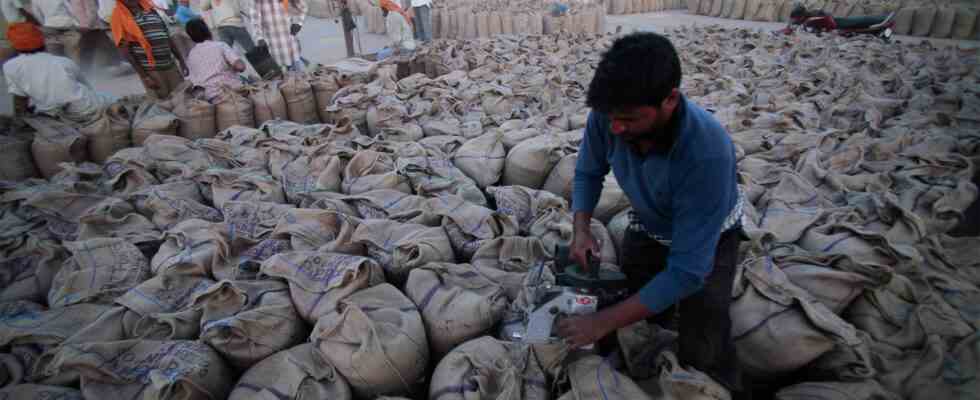Status: 04/30/2022 10:46 a.m
Water shortages, imminent crop failures and an endangered infrastructure: The consequences of the ongoing heat wave in northern India are already dramatic – and the frequency of extreme temperatures is increasing.
They’re only a dozen or so, but they’re not giving up. The fire is very difficult to extinguish, says a firefighter on the hose. They refilled the water for the second time now.
A huge mountain of rubbish in north Delhi. It started burning days ago from the extreme heat. The fire brigade tries to extinguish the fire with water, but they cannot do much. There are only three fire engines anyway – far too few for the countless sources of fire. Fireman Kuldeep stands at one of the vehicles and controls the water supply. He’s angry with the city government.
heat and stench
It’s taking far too long, he complains. The Delhi Fire Department is not working properly. You have robots, but they are not brought here. They could put out the fire quickly. It seems Chief Minister Kejriwal is not giving permission. “How are we supposed to put out the fire then? If the robot had come, the fire would have been under control the day before yesterday,” says Kuldeep.
You can’t stay here for long. It is unbelievably hot here in the immediate vicinity of the garbage mountain. And it smells horribly: sweet, chemical, poisonous. Kuldeep and his colleagues wear sand-colored protective suits and helmets, and it must be even hotter underneath. Kuldeep is lucky that he can stay down. One of his colleagues is standing with the hose further up in the stinking, red-hot heap of rubbish.
Orange alert
“It’s official,” reports news channel India Today that this is India’s hottest summer on record. India is experiencing its cruelest summer with the worst heat wave.
Meteorologist Jayati Singh explains on screen which regions are hit the hardest. The orange warning level prevails throughout north-west India – also in central India, parts of eastern India and the state of Gujarat. A heat wave has been announced for the next five days. The heat started unusually early this year, says her colleague Rajendra Jenamani.
Not the first heat wave this year
This heat wave, which has intensified, is actually the third this year. There was a very long period from late March to mid-April, followed by a short one. This heat wave started two or three days ago, first in East India, and since yesterday North West and Central India has been affected. This heat wave will probably continue on May 1st or 2nd.
The consequences are dramatic: the infrastructure is under extreme strain, water is becoming scarce in some places, and the power grids regularly collapse in some places. Electricity comes mainly from coal-fired power plants, and those in particular are now running out of coal.
New Delhi threatens to collapse
The regional government warned that two power plants that are important for New Delhi would still have coal for a day or two – and called for support from the central government. Otherwise the subway in the city of 20 million could no longer work and hospitals would also be at risk. To deal with the coal shortage, passenger trains are now being removed from the timetable to make way for freight trains that transport coal across the country.
Agriculture was also badly hit. Because the heat wave is also accompanied by a lack of rain. In some regions of northern India, there has been 80 percent less rainfall in recent weeks than in previous years.
Agriculture is also suffering
Farmer Suresh Singh is at a loss. The harvest suffered because of the heat wave, he reports. The water level dropped due to the sudden rise in temperature. The great heat has decimated his crop yield by half.
His nephew Satbir blames climate change for the great drought. The biggest problem with climate change is that it will soon no longer be possible to farm. The water level keeps going down. According to Satbir, most of the village’s water sources have already dried up.
The frequency increases
Heatwaves like this used to happen every 50 years, but now they happen every four years, says one researcher. But relatively little is discussed about it these days. Prime Minister Narendra Modi said at the Glasgow climate summit last year that climate neutrality could not be achieved for India until 2070 – 20 years later than planned. Because India needs energy to grow and to feed its people. And this energy currently comes mainly from coal.
Extreme heat wave in northern India
Peter Hornung, ARD New Delhi, April 29, 2022 5:59 p.m

